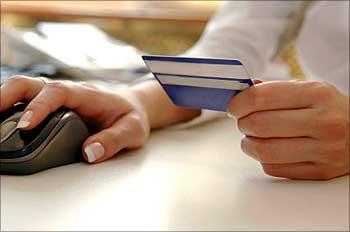
Banks have started charging customers for payment of credit card bills through cheque and so paying online makes more sense, says Arnav Pandya.
Since the beginning of the financial year, banks have been increasing their charges for the services they offer at the branch, especially for cash deposits and withdrawals.
Most banks now also charge a fee for payment of credit card bill made in cash at a branch.
By thus punishing customers for credit card bill payments made through cheques, they are forcing them to pay this bill via electronic modes.
The State Bank of India has started levying a charge of Rs 100 on payments below Rs 2,000 made by cheque to settle credit card bills.
Since the SBI is the country's largest bank, many credit card users are worried that other banks could also follow suit.
After banks started levying charges on cash payments to settle credit card bills, there has been a drastic fall in such transactions.
On a credit card bill of below Rs 2,000, a charge of Rs 100 is significant -- five per cent.
The lower a cardholder's bill, higher is the impact.
For such customers, shifting online to make this payment works out to be a much better option.
Shift your focus
The usage of electronic routes to make payments involves a process of transfer of money from an individual's account to that of another entity.
This can be done online directly -- from your account to that of the entity.
It can also be done by visiting your bank and asking it to do an online transfer to another account.
Until now, most cardholders focussed on paying merchants using their credit cards. After the introduction of the new charges, they now also need to focus on the mode they adopt to repay their credit card outstanding.
Going electronic
Many options are available to cardholders adopting the online mode to settle credit card bills.
It can be done on the bank's Web site or even through the mobile.
NEFT
One of the best routes for making an electronic payment for your credit card dues is via National Electronic Funds Transfer, NEFT.
This is a way to transfer funds electronically between two bank accounts.
It is used for fund transfers of up to Rs 2 lakh.
One can transfer funds through this means both online as well as by making a physical request at the branch.
If you can, opt to do it yourself as it makes life easier.
All you need to do is add the entity to the list of beneficiaries using its details.
Once added, you can transfer with just a few clicks.
You don't have to enter the beneficiary's details every time you transact.
The details you need for the transaction include the entity's account number and IFSC code.
Most credit card issuers provide these details in their monthly bill statement.
But if you approach your bank for an NEFT transfer to the card issuer, it will involve a bit of paperwork.
You will have to fill up a physical form and submit it at the branch.
NEFT transfers are not instant, but they are fast.
The money reaches the destination bank account within a few hours.
Earlier banks used to make batch transfers every hour. That interval has now come down to half an hour.
You can be assured that your payment will be credited the same day.
It saves you from worrying about the cheque getting cleared within the time limit so that you don't miss the due date due to delay in clearance.
Internet banking
Those who are technologically savvy will find the Internet banking route the easiest.
There are two ways in which this payment can be made.
One, the cardholder can go to the issuer's Web site. S/he then needs to enter the specified details.
Once you click on pay, you are transferred to the net banking page of your bank account from where you can make the payment.
The other way is to log into your net banking account.
If your card issuer is the same as your bank, your net banking will have an option to pay credit card bills.
Banks usually map the credit card to the customer's bank account.
You, therefore, have the credit card payment option automatically on your net banking page. This transfer is instant.
But if your card issuer is different from your bank, you have to add it as a beneficiary and then do the fund transfer.
While your funds get transferred the same day if you do so during banking hours, the issuer usually intimates the card holder a few days later that it has received the payment.
The payment may also take a few days to reflect in your credit card account.
These days you also have the option of Immediate Payment Service, IMPS.
It transfers funds instantly from one account to another.
But in most cases, you cannot do an IMPS transfer to the card issuer. It has to be done using NEFT.
Mobile banking
Another route that can be used to make such transfers for credit card payments is mobile banking.
Here the payment takes place through the bank's app, and that is the only difference.
The underlying technology and process are the same as online banking. It means you will need to add the beneficiary.
In future, other banks could also impose charges on credit card bill payment done through cheques. Some could even levy a higher fee than the SBI if they want to force customers to adopt online payments.
It's therefore better that you shift to online payments before your bank introduces new charges.
Cheques are out, online transfers are in:
- Earlier, banks only charged for credit card bill payment via cash.
- Now, there's fee on bill payment via cheques.
- SBI charges Rs 100 for payment up to Rs 2,000. Other banks may follow suit.
- The best option for customer is to shift to online payments.
- NEFT payment is the fastest mode of transfer for repayment.
- Now, money is credited in half an hour.
- You can also go to issuer's Web site to pay bills using Internet banking.
- For more PERSONAL FINANCE features, please CLICK HERE
Arnav Pandya is a certified financial planner.












 © 2025
© 2025